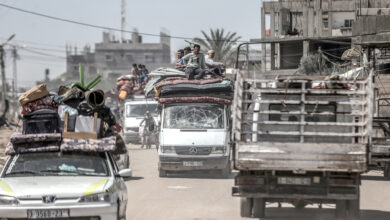A senior army official said one of those killed was Abdul-Rahman Awad, a Palestinian leader of the Fatah Islam group. Awad's aide, Ghazi Faysal Abdullah, who was also known as "Abu Bakr," was also killed in the gunbattle in the town of Chtaura, in the eastern Bekaa Valley, the official said.
Another army officer said Awad's brother identified Awad's body. Both officers spoke on condition of anonymity, in line with regulations.
Awad was one of the most wanted men in Lebanon, and his death would mark a major blow to Fatah Islam. The group was little known before the summer of 2007 when it battled the Lebanese army for three months in the Palestinian refugee camp of Nahr al-Bared in northern Lebanon. About 220 militants and 171 soldiers were killed in the fighting. Palestinian officials put the civilian death toll at 47.
It has been blamed for deadly blasts that killed more than a dozen Lebanese soldiers in the northern city of Tripoli two years ago, as well as an attack on UN peacekeepers patrolling an area near Lebanon's border with Israel.
Lebanon's authorities have stepped up pressure on the group since the 2007 clashes, and last year, a Lebanese military court convicted 12 Fatah Islam members of carrying out terrorist acts, including a bomb attack on UN peacekeepers. Five of the men — including Awad – received life sentences in absentia.
A Lebanese army statement confirmed that two militants were killed Saturday after a gunbattle broke out when officers tried to detain them, but the statement did not identify those killed.
Awad, who was about 40, was born in the Palestinian refugee camp of Ein al-Hilweh, a haven for militants in southern Lebanon, and was married with several children. He was known by his nick name, "Shahrour," while some referred to him as "Abu Mohammed."
The one-time leader of Fatah Islam, Shaker al-Absi, has not been heard from since the 2007 clashes with the army. In 2008, a statement purportedly posted by the group on an Islamic militant website said al-Absi was probably killed in Syria.
The statement also said the group had elected Abu Mohammed Awad as its leader but gave no further details.
On another level, Lebanon said on Saturday it was setting up a fund for Lebanese to help arm its under-equipped military, days after lawmakers in Washington blocked US military aid.
Defense Minister Elias al-Murr said the fund hoped to attract donations from the millions of Lebanese living abroad as well as local residents. Murr said he was making the first contribution, equivalent to $850,000.
The decision to set up the fund comes after US Congress decided earlier in the week to suspend $100 million in aid over concerns that the equipment would be used against Israel or would fall into the hands of Hizbullah, for use against the Lebanese army.
The move came after a deadly cross-border clash between Lebanese and Israeli troops last week.
Murr has criticized the announcement, saying that any party that wished to help the military had to do so without conditions.
He said on Saturday the new fund was part of an initiative launched by Lebanese President Michel Suleiman to build up the army. Suleiman's announcement prompted Iran's ambassador to Lebanon to offer Iran's support to the military.
The US State Department said the statement by Iran, which is likely to alarm Western countries who fear Tehran is increasing its influence near Israel's northern border, demonstrated the need for continued US support to Lebanon.
The United States has provided close to $1 billion in assistance to the army since 2006 to Lebanon.




